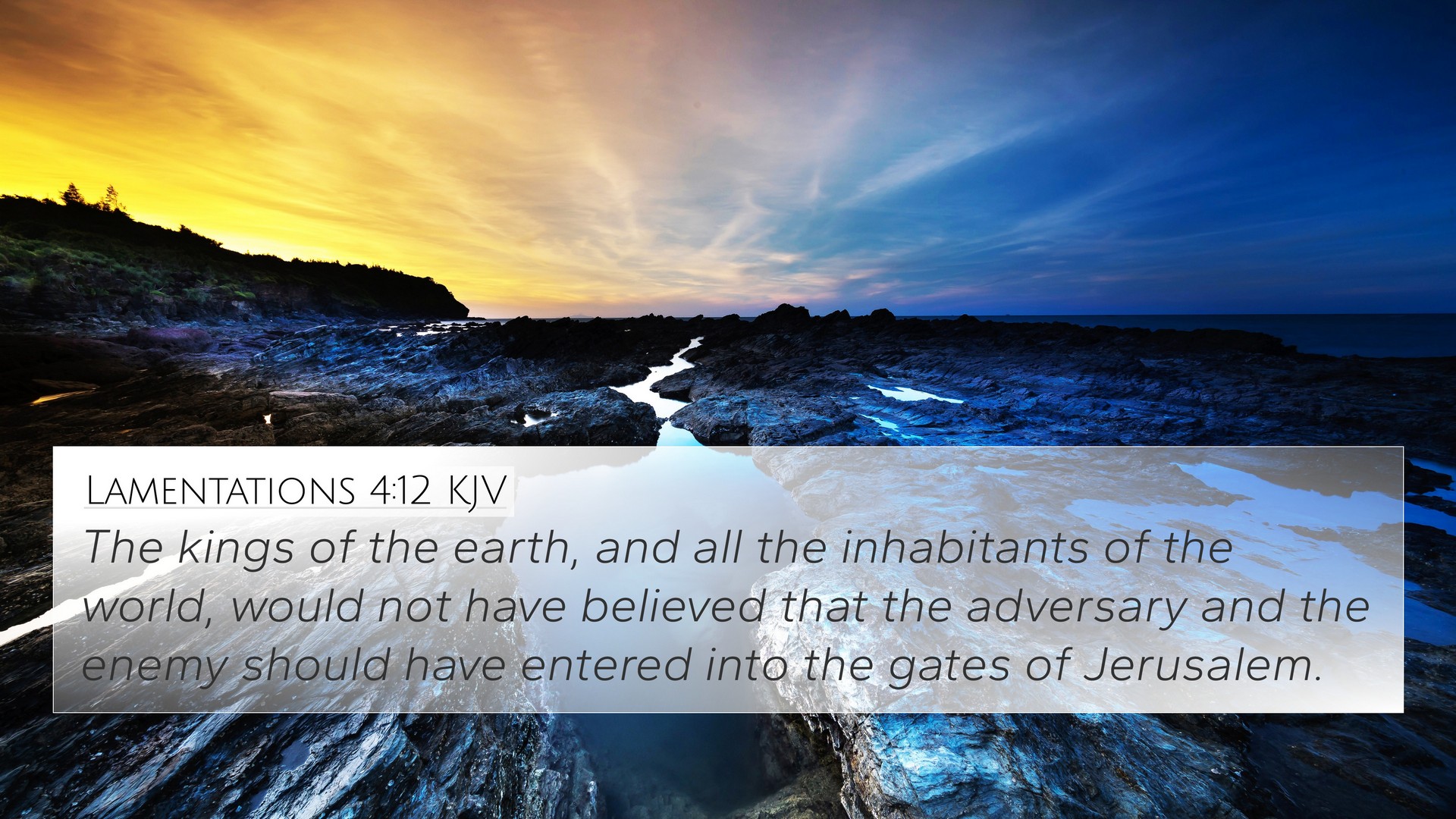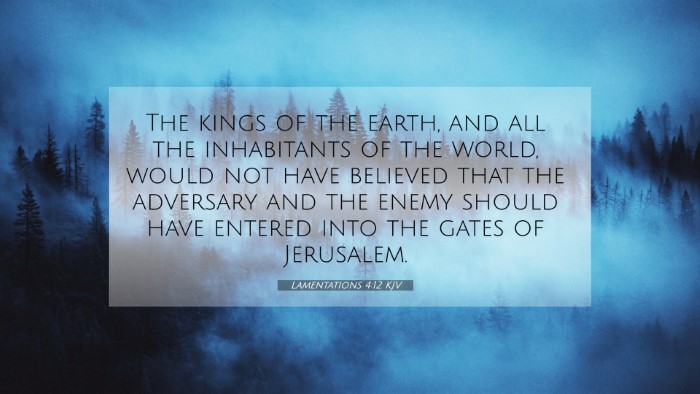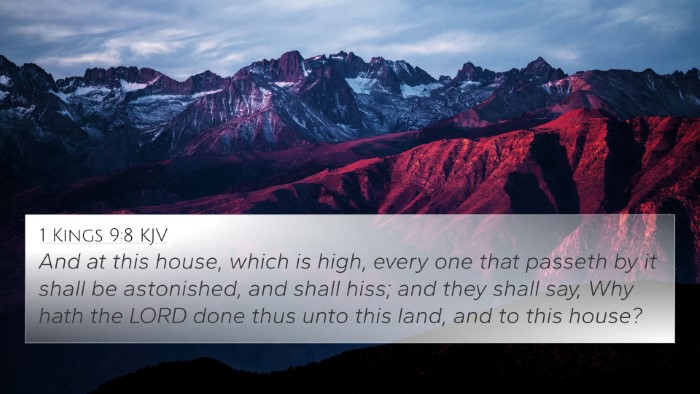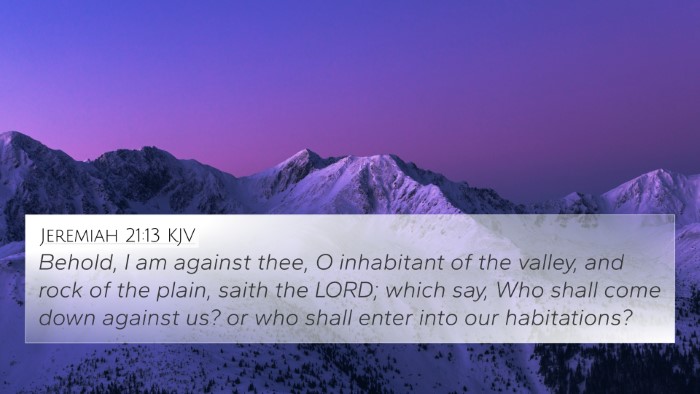Lamentations 4:12 states: "The kings of the earth, and all the inhabitants of the world, would not have believed that the adversary and the enemy could have entered the gates of Jerusalem." This verse poignantly reflects the devastation experienced by Jerusalem and serves as a lament over the unimaginable horror faced by its people. The context of this passage delves into the consequences of sin and disobedience to God, resulting in profound suffering and isolation.
Understanding Lamentations 4:12
The verse opens a window into a profound theological and historical reality. The commentaries of Matthew Henry, Albert Barnes, and Adam Clarke provide essential insights into this lamentation, signifying the dramatic shift from a place of prominence to one of desolation.
The Fall of Jerusalem
-
Historical Context:
The commentary of Matthew Henry highlights that the destruction of Jerusalem was something that no one anticipated, not even the kings of the earth. The contrast between Jerusalem's former glory and its present despair underlines the Sovereignty of God in judgment.
-
Surprising Devastation:
Albert Barnes notes that the disbelief of the nations regarding the fall of Jerusalem illustrates the severity of God's judgment, taking even powerful kings by surprise. This serves as a reminder that God's plans and judgments are beyond human comprehension.
-
The Nature of the Adversary:
Adam Clarke discusses the "adversary" mentioned in the verse, indicating that spiritual warfare was at play. This enemy, likely referencing Babylon or the forces of evil, infiltrated what was once thought to be an impregnable city, highlighting the fragility of human strength against divine will.
Spiritual Insights
-
Divine Judgment:
The verse serves as a stark reminder of the consequences of straying from God's commandments. It aligns with the themes of judgment seen throughout the Scriptures, correlating with Jeremiah 25:8-11, which speaks of the destruction brought upon the land due to disobedience.
-
The Role of Faith:
The absence of faith is a central theme in this passage. Barnes asserts that faith could have prevented such devastation but was instead replaced with disbelief and despair among the inhabitants, connecting it to Hebrews 11:6, where faith is needed to please God.
-
The Unimaginable Nature of Suffering:
The surreal pain expressed in this lamentation resonates with the sufferings noted in Psalms, such as Psalm 137:1, where the exiled Israelites weep by the rivers of Babylon. This emotional connection emphasizes the depth of sorrow experienced by the people.
Bible Cross-References
The themes in Lamentations 4:12 can be cross-referenced with several other passages that enhance the understanding of its meaning:
- Jeremiah 52:4-5 - The siege and fall of Jerusalem
- Isaiah 40:28-31 - God’s understanding of human frailty
- Amos 3:6 - The consequences of sin
- 1 Peter 5:8 - The adversary depicted as a roaring lion
- Lamentations 3:39 - The nature of suffering in relation to sin
- Psalm 73:18-19 - The end of the wicked
- Daniel 9:12-14 - Acknowledgment of transgression and its consequences
Thematic Connections between Bible Verses
Lamentations 4:12 engages in dialogue with other Bible verses, exploring themes such as divine justice, human suffering, and spiritual warfare. The dynamics between these verses create a rich tapestry of understanding that articulates God’s character and humanity's frailty.
Learning through Cross-Referencing
Engaging in cross-referencing, as suggested by many biblical scholars, provides a more comprehensive view of Scripture. Tools like a Bible concordance or cross-reference guide can facilitate deeper insights and connections. The intricate web of scriptural references allows for a greater understanding of how individual verses reflect broader themes.
In summary, Lamentations 4:12 is not only a poignant account of loss but serves as a critical reflection on the importance of faith and the dire consequences that ensue from turning away from God. The collective insights from Matthew Henry, Albert Barnes, and Adam Clarke present a multi-dimensional understanding that connects this verse to a plethora of other biblical texts, showcasing the importance of cross-referencing in biblical study.






